Cajoling My Palate to Appreciate Jordanian Coffee

Every morning of my growing-up years, I awoke to the smell of coffee. Not only did Dad have to have it to start his day, but in later years, when he was the rural mail carrier for our address, he stopped at our home around 9:30 a.m. for his second (or third) cup. And he carried a full Thermos on the route. There was at least another for dinner that evening.
Mother also imbibed the brown liquid I thought looked like mud pie run-off. Coffee always had a place of honor in our home.
But I could not—and cannot—stand the stuff. Neither the smell nor the taste. It should have loomed large in my DNA. But nope.
Tea was the same thing.
Mother never made tea. She made gallons of Kool-Aid. We called it Mom’s Punch, later Grandma B’s Punch. The base was Kool-Aid, but she poured in the mandatory one cup of sugar plus whatever fruit juices or concoctions she had on hand. It was never the same, but it was always good.
The point to this story is that I never developed a taste for coffee or tea. That’s almost un-American.

Cough Before You Come Through the Door
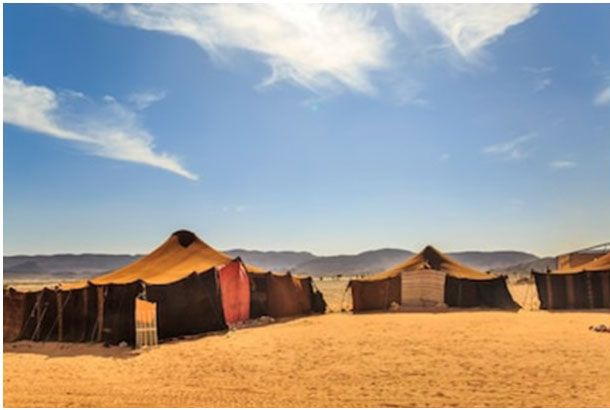
The daily ritual of coffee preparation starts early in the Bedouin world. A man rises shortly after dawn to roast coffee beans in a pan over the fire. He puts on water to boil as he rhythmically grinds the beans with a mihbash, a mortar and pestle. That jangling beat alerts those in nearby tents that coffee is coming soon.
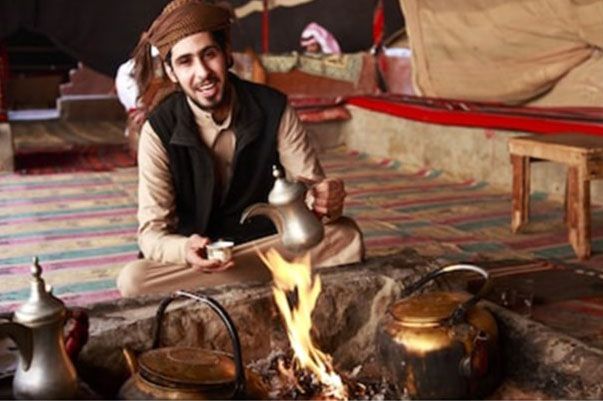
Then he brews it in a dalleh, a long-spouted pot set in the embers and serves it to everyone present in thimble-sized cups. The neighbors don’t need an invitation. In lieu of a doorbell, they politely cough loudly enough to announce their arrival.
Here’s a great little clip about early morning brewing a cuppa.
The coffee maker takes the first sip to show guests it tastes good, is the right temperature, and is ready to savor. In the old days, it was to prove it wasn’t deadly.
The guest of honor is served first, and everyone else is taken care of clockwise around the circle.[1]
Each person is allowed up to three cups. Cup one is called “for the guest.” Cup two is for “the mood” or relaxed atmosphere. Cup three is “for the sword,” indicating that animosity has evaporated..[2]
No conversation allowed until everyone has drunk their coffee, so it is important to down it quickly. Jiggle your wrist as you hand the miniature cup back to the host to indicate you are finished. Otherwise, no jiggle means, “I want more.”
The Coffee Speaks
A problem arises if the guest of honor sets their cuppa coffee in front of them without drinking it. The coffee speaks: either the guest has a request or there is an unresolved problem between him and the host.
If the problem or request is not taken care of and the guest leaves without drinking the first cup, this is a serious insult. Arbitration is called for. Quickly.
The Hatfields and McCoys

If a guest utters the phrase gahwahtak saydeh, roughly translated, “Your coffee is tainted or bad,” it might cast a pall over the gathering. If the others agree that something is amiss with the coffee, no harm, no foul.
HOWEVER, if everyone else likes the coffee, it is presumed the guest is deliberately insulting the host, and it may result in very serious consequences. We might call it a duel in the U.S. The guest is calling out the host.
Honor and Revenge
This last scenario can mean life or death.

A man could speak to his neighbors and proclaim a cup of coffee to be a “blood cup.” That means whoever takes that thimbleful to his mouth and swallows it has accepted the mission of cleansing family honor by taking revenge on a named enemy.
If that person does not carry out his duty, his fate is dishonor and exile.
There are many more such traditions – and they aren’t limited to tent-dwelling Bedouin. Even in modern homes, where the beans might be pre-roasted and the coffee made in a Keurig, the rituals and meanings remain unchanged. Coffee is more than just a drink—it’s an integral part of Jordanian culture.[3]
Coffee’s Role in Marriage
Coffee isn’t just about appreciating hospitality. It is an important part of negotiation in Bedouin culture.
When the discussion includes business, negotiations, or marriage, coffee plays an important role. For instance, if a man has an interest in marrying, he and his father visit the home of a potential candidate for permission from the women of the house. Traditionally, marriage is encouraged between first cousins on the paternal side so property remains within the family.
Once a suitable choice is decided upon, the young man meets with his potential spouse several times to decide whether the marriage will come to fruition. She does have a choice. The father of the bride then meets with the young man and his father to give them a decision.[4]
The answer comes through the coffee, with either the entire family drinking a cup together or no one taking a sip. No verbal communication is needed.[5]
When it is a non-Bedouin wedding, a similar ritual takes place, but the deal is always confirmed over rounds of coffee between the parties and their fathers.[6]
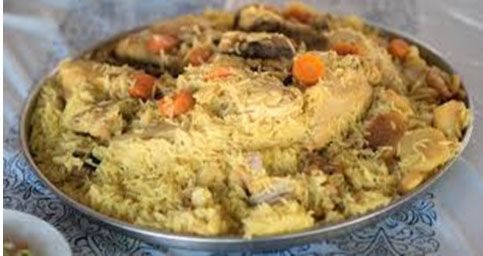
That Famous Hospitality Again
There are four English words which come from a common root: the Latin noun hospes. Those words, called doublets because they are derived from the same source but have different meanings, are:
- hospital
- hostel
- hotel
- hospice
Hospes originally meant “a guest or visitor” and “one who provides lodging or entertainment for a guest or visitor.” The word host meaning “one who entertains guests” is also related.[7]
Hospes was a place of rest where someone would provide food, drink, and a bed to weary travelers. It is easy to see how the other meanings came from that thought.
The host also serves the guest copious amounts of food and is careful to make sure he or she is comfortable and stays as long as they like. Such displays are referred to as karam, the Arabic word for “generosity” or “hospitality.” It also implies “nobility,” “grace,” and “refinement.”[8]
In addition to wanting to be hospitable, the host also has a reputation at stake when inviting over a guest. It is the mark of a man as to how he treats his guests, and where what is unsaid has as much (or more) resonance than what is said. Coffee plays a hugely significant symbolic role.[9]
Once you have partaken of coffee as a guest, you are under the protection of the host.[10]
Coffee – the Life Blood of Jordan
As I have mentioned in previous blogs, the world-renowned Jordanian hospitality flows from the Bedouin tradition. But modern Jordanian city-dwellers exhibit the same traditions.
It would not be unusual for someone who is a virtual stranger to invite you to their home in Jordan. They would greet you enthusiastically with smiles all around and questions that might make you uncomfortable. They love asking personal questions about you and your family.
They will likely serve you tea, coffee, and mansef, Jordan’s national dish of lamb cooked in a sauce of fermented dried yogurt with rice or bulgur. They drink tea and coffee many times throughout the day. They do not use sugar in the bitter coffee, which is brewed with big doses of cardamom and served in small sips.[11]
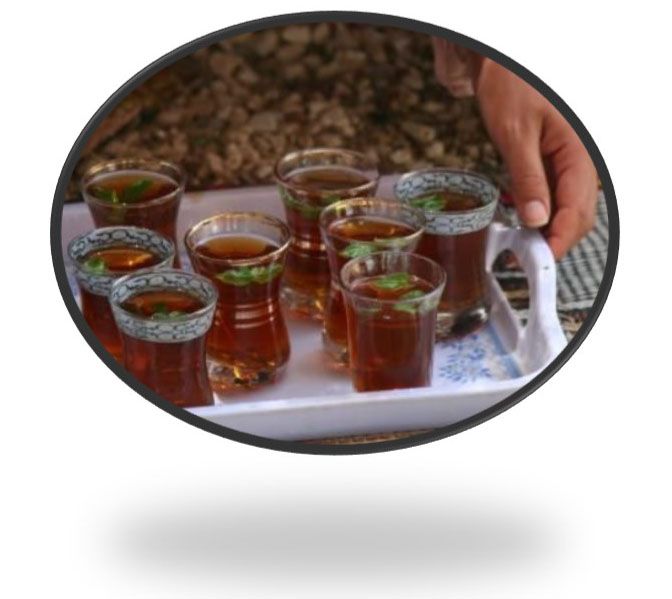
Saying No is Not an Option
Here is what Taline Khansa, a visitor to Jordan, had to say in her blog.
“Regardless of the purpose or length of the meeting or visit, it all starts with a cup of coffee, tea, or juice. Saying no is not an option! If the visit is any longer than an hour, you are almost guaranteed to be fed. Again, you should delete the word “No” from your vocabulary, because it is considered rude to decline such an invitation…. and you really won’t be given an alternate option!”
My Predicament
So you see, it’s not like in the U.S. where I can (and do) smile sweetly and say to my hostess, “Thank you, but I never learned to appreciate coffee or tea. I’m weird.” One is simply not allowed to dislike coffee and tea in Jordan. It is a major social breach.
Recently, Al and I journeyed to Tulsa to visit with friends and celebrate our wedding anniversary. We ate our festive meal at a local Mediterranean restaurant named Helen of Troy, where we had eaten several times before. With a restaurant named like that, we never dreamed the owner was Jordanian. We thought he was probably Greek.
It was two days after Christmas, and business was very slow, as it always is right after that holiday. We and our friends were the only customers in the room. So we received personalized attention from the owner, Sameer.
We told him of our plan to move to Jordan, and after the expected question, “Why?”, I told him of my dilemma.
“Sameer, I really don’t like coffee or tea. I don’t like the smell. The taste makes me gag. What can I do or say so I don’t offend my Jordanian host or hostess?”
He shrugged his shoulders as though to say, “Well, you can’t help it if you don’t like it.” Then he went straight for my jugular when he agreed that it would be a major insult to refuse. He looked at me with piercing eyes, cocked his eyebrow as he lowered his head slightly, and said in that exotic Jordanian accent, “What is most important?”
So I leave you with a question: What do you think I should do? Any suggestions?
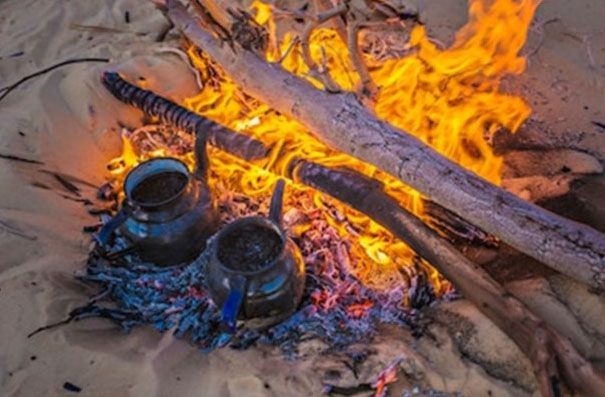
[1] https://www.roughguides.com/destinations/middle-east/jordan/culture-etiquette/
[2] https://epicureandculture.com/bedouin-hospitality-immersing-myself-in-jordans-bedouin-culture/ Accessed 12/24/19
[2] https://www.roughguides.com/destinations/middle-east/jordan/culture-etiquette/
[4] Shryock, Andrew. “The New Jordanian Hospitality: House, Host, and Guest in the Culture of Public Display”. Comparative Studies in Society and History , Vol. 46, No. 1 (Jan. 2004), pp. 35–62.
[5][5] https://epicureandculture.com/bedouin-hospitality-immersing-myself-in-jordans-bedouin-culture/
[5] Ibid., Shryock
[7] https://www.merriam-webster.com/words-at-play/word-history-hospital-hostel-hotel-hospice
[7] https://www.pbs.org/lawrenceofarabia/revolt/hospitality.html
[7] Ibid. Shryock
[7] https://www.roughguides.com/destinations/middle-east/jordan/culture-etiquette/
[7] https://www.international.gc.ca/cil-cai/country_insights-apercus_pays/ci-ic_jo.aspx?lang=eng
[12] https://pages.kiva.org/blog/jordanian-hospitality-and-secrets-to-the-perfect-cup-of-tea
